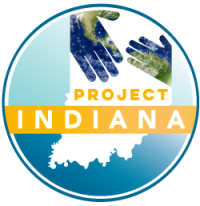Sharing light and hope: Project Indiana thankful for those who make electricity possible at home and abroad

In the first year of his presidency, George Washington asked the people of his nascent nation to set aside Thursday, Nov. 26, 1789, as a day devoted “to the service of that great and glorious Being, who is the beneficent Author of all the good that was, that is, or that will be.”
In the midst of the bloody Civil War in 1963, President Abraham Lincoln, as he had done throughout his presidency, also asked the nation to give thanks to God for the nation’s blessings and created an official recurring Thanksgiving holiday — which, that year, also was Thursday, Nov. 26.
In this presidential election year of pandemic, racial injustice, social unrest and civil strife, Thanksgiving once again falls on Nov. 26. In spite of the difficulties we’ve experienced, Americans can still look out and realize we have been a blessed nation for which we have much to be thankful.
At Indiana’s electric cooperatives, one way thankfulness is expressed is the way it’s paid forward through Project Indiana: Empowering Global Communities for a Better Tomorrow.
The non-profit organization was founded by Indiana Electric Cooperatives as an ongoing commitment to improve the lives of rural Guatemalans after crews of Indiana electric cooperative lineworkers spent a month in the rugged northwestern mountains of Guatemala building power lines to three villages that had never had electricity before. That first trip was in the autumn of 2012. Since then, crews have made three more trips to three other areas of rural Guatemala, in 2015, 2017 and 2019. A fifth trip is now being planned for the fall of 2021.
These trips change the linemen as much as they change the lives of the Guatemalan villagers. Linemen return home to family and coworkers speaking of the beautiful and humble villagers they meet. They have a new appreciation for what it means to be poor — as they see hardworking people living day-to-day, sustaining themselves and their families with subsistence farming, cooking in huts with packed dirt floors over open fires, and sleeping in one-room quarters. These people have so little, but they offer what they have to the American strangers who soon become friends in the two, three or four weeks the projects have taken.
Building and working on electric power lines is never easy, even in rural Indiana. Imagine working without the benefit of modern bucket trucks and power augers. Everything is built by hand from the ground up. Indiana linemen climbed steep mountain slopes and poles the old-fashioned way and strung wire across the ravines and mountainside coffee fields in misty clouds sometimes 10,000 feet above sea level, or through the heat and humidity of jungles, their trails being cleared by villagers with machetes hacking the brush away as they went.

Being a lineman is hard and dangerous. Doing this work 1,800 miles from home in the rugged areas of Guatemala makes it even harder. But Project Indiana is committed to helping these people have better lives electricity will bring. Electricity brings and will bring better health, better opportunities through new schools, better roads and a better future for the children. Truly, our linemen are the heroes. And just looking at the photos of the faces of the children and adults who received the power at any of the thanksgiving celebrations the villagers have held for crews their thankfulness is evident.
But just as with our military heroes from the Civil War to those still deployed overseas today, good deeds for others can’t be done without strong support — and prayers — from the folks on the home front. And that’s what all the linemen’s families, their cooperative co-workers, directors and their consumers have given. The “buen trabajo” (good work) for which our crews are celebrated also belongs to all who have supported Project Indiana over the years.
The thankfulness of those family members who gather at the airports to welcome the line crews home is a powerful and heartwarming homecoming every time. The children hold signs and scream. Wives shed tears of thanks-be and joy as they embrace their husbands, home safe after being gone for so long. Cooperative staff get goosebumps watching it all unfold knowing they work for something so much bigger than themselves, their own cooperative, and even the statewide and national electric cooperative associations and their member cooperatives. They are working for something that spans borders and beliefs.
Politics and policies may cloud one nation’s view of another. But the people in those rural Guatemalan villages will be forever grateful to the “Hermanos Americanos” — the “American brothers” from Indiana who gave them light — and hope for a better future.
“Now, there are people in Guatemala — just as there are in Indiana — grateful that these linemen have a passion for what they do, and that they do it so well,” noted Diane Willis, a former Indianapolis TV-news anchor, now a freelance journalist, who chronicled the first trips in 2012 and 2015. She is now a member of the Project Indiana board of directors.
“You see how hard they work for the little they have,” added Jamie Bell, a coordinator of the 2019 mission from NineStar Connect. He, too, now volunteers on the non-profit Project Indiana board. “Electricity gives them a powerful tool to better themselves — to make them want to stay there,” he said. “With it, they’ll have better health, better schools, just an all-around better way of life. I just feel as if there’d be something wrong with any of us if we didn’t want the best for people like that.”
This Thanksgiving, let’s all be grateful for our abundant blessings, like reliable electricity — for ourselves, in our homes, and that we have played a small role in helping people have better lives, too, in Guatemala.
